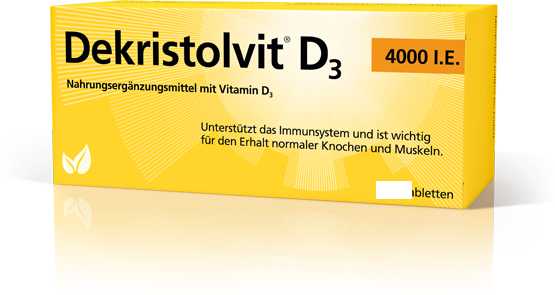HLH BioPharma
Dekristolvit Vitamin D3 4,000 IU 30 Tablets
Dekristolvit Vitamin D3 4,000 IU 30 Tablets
5.0 / 5.0
(1) 1 total reviews
Couldn't load pickup availability
Application
Take 1 tablet daily with a meal. Children from 1 to 10 years of age can take 1/2 tablet daily with plenty of ì liquid with a meal.
Method of application
FOR THIS, THE BODY NEEDS VITAMIN D
On the immune system
Vitamin D has a regulating effect: it is believed that it promotes the production of various immune cells that are needed to fight infections, for example. On the other hand, it may contribute to the counter-regulation of misdirected immune reactions, which play an important role in allergies and autoimmune diseases.
For strong bones and healthy teeth, the body needs vitamin D in two central places: In the intestine, it promotes the absorption of minerals so that they can enter the blood. But the body also needs vitamin D for their incorporation into the bones and teeth.
Vitamin D is involved in the fact that calcium can get into the muscle fibers. They need the mineral for muscle tension and strength development. However, vitamin D also stimulates the production of special protein bodies via its special binding sites and thus the development of further muscle fibers.
Vitamin D is involved in the control of cell division and growth.
According to the German Nutrition Society (DGE), blood levels of at least 50 nmol/l vitamin D are required for the key vitamin to perform its numerous tasks. Values below 50 nmol/l are described by physicians as suboptimal, and values below 30 nmol/l are referred to as a deficiency. Only at values above 125 nmol/l is it assumed that there is a possible risk of oversupply.
Some laboratories and publications give these values in the unit ng/ml. The range for a suboptimal supply includes values from 12 to less than 20 ng/ml, and an adequate supply is 20 to less than 50 ng/ml.
It is important to note that even suboptimal blood values can lead to impairments of the functions for which vitamin D is needed.
Today, a total daily intake of 4000 IU of vitamin D is considered safe for children aged 11 and over, adolescents and adults. This was confirmed by the European Food Safety Authority (EFSA) on behalf of the EU Commission.
Share


